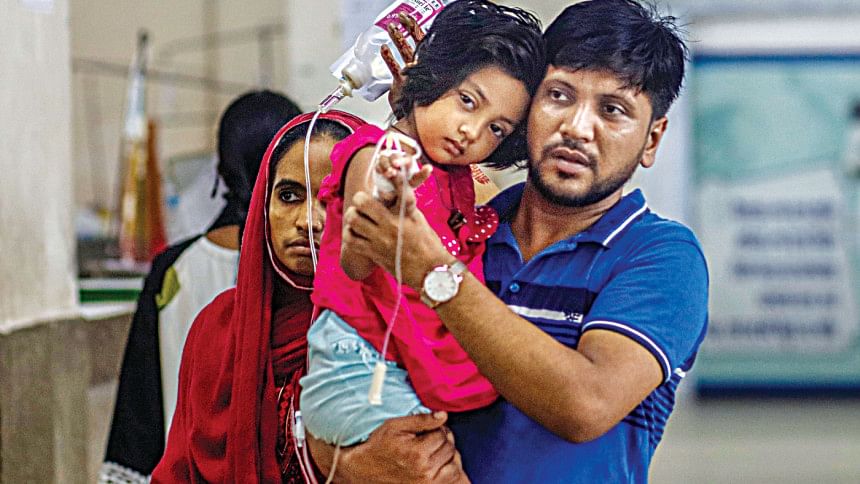Dengue Cases From Aug 20 To 26: Over 56pc deaths due to shock syndrome

Around 56.79 percent of the 71 dengue patients, who passed away between August 20 and August 26, died of shock syndrome while 10.4 percent died of expanded dengue syndrome, according to data of the Directorate General of Health Services.
Some 3.4 percent of the deceased had comorbidity while 2.3 percent died from dengue hemorrhagic fever, shows the DGHS data released on Sunday.
The health directorate found 44 percent of the 71 patients died within a day after hospitalisation while 35 percent passed away within two to three days, 8 percent within four to five days, 10 percent between six and 10 days, and 3 percent after more than 10 days.
The World Health Organisation in 2012 had coined the term "expanded dengue syndrome" to describe patients that do not fit into either DHF (dengue hemorrhagic fever) or DSS (dengue shock syndrome) but show atypical symptoms in vital organ systems such as the cardiovascular system, neurological system, kidneys, gut, and hematological system.
Meanwhile, eight more dengue patients died in 24 hours preceding yesterday morning, taking this year's total dengue fatalities to 556, said a DGHS release.
At least 2,331 dengue cases were reported in the 24-hour period, raising the caseload to 116,842.
Of the 556 deaths, 410 were logged in Dhaka. A total of 320 of the deceased were females.
HM Nazmul Ahsan, associate professor at the Shaheed Suhrawardy Medical College Hospital, said second-time dengue infection with a different strain and late hospitalisation are among the main reasons for the rise in deaths this year.
He said a large number of patients get admitted to hospitals after suffering from dengue shock -- a critical stage of the disease.
There are many who don't realise that they have symptoms and that's why they don't visit hospitals, the physician said, adding these type of patients are more likely to suffer from shock syndrome.
"Shock syndrome in dengue patients are of two types -- compensated shock and decompensated shock. In compensated shock, a patient's blood pressure may be low or apparently normal, with narrow pulse pressure of 20 or less," Nazmul said.
Pulse pressure is the difference between the systolic and diastolic pressure of a person.
"... In decompensated shock, the patient is disoriented with cold clammy skin, unrecordable blood pressure, pulse, and unable to urinate. Within a few minutes, many patients die in spite of getting treatment," he said.
Despite given treatment, death rate is high among those patients who go to hospitals after suffering from decompensated shock, he told The Daily Star.
He said death rate is also high among the high-risk group of patients who are obese and elderly, pregnant, infant, and have comorbidity.
Nazmul said severe stomach aches, breathing difficulties, severe weakness, bleeding from gums or nose, and vomiting are the symptoms for which patients need to be hospitalised immediately.
"If a patient showing warning signs is not hospitalised within 48 hours, s/he may suffer from shock syndrome."
If a patient is hospitalised immediately after suffering from compensated shock, s/he is not likely to suffer from decompensated shock, he said.
The doctor said the chance of recovery for patients suffering from decompensated shock is only 50 percent.
"A patient's blood pressure may remain normal after suffering from compensated shock and that's why he may not realise it. Some of the signs of compensated shock are drop in body temperature, increased heart rate, and rapid breathing," Nazmul added.
There are four dengue strains -- Den-1, Den-2, Den-3, and Den-4. Of them, Den-2 is mostly active this year and the severity of this strain is high. This is another reason for so many deaths this year, he said.
The physician said early consultation with doctors and proper medication are essential for dengue patients.

 For all latest news, follow The Daily Star's Google News channel.
For all latest news, follow The Daily Star's Google News channel. 



Comments